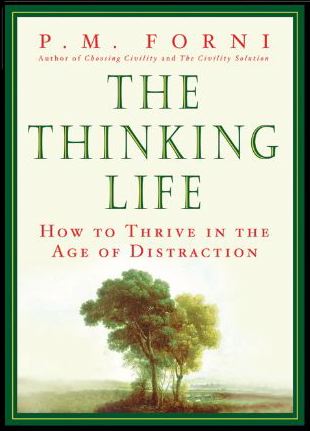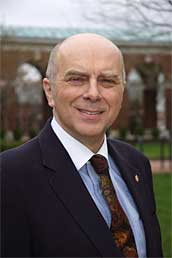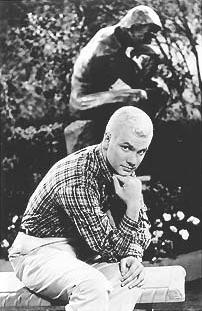 NOTED ACADEMIC CITES BENEFITS
NOTED ACADEMIC CITES BENEFITS
OF CLASSIC GREEK PHILOSOPHY
By Anthony C. Hayes
You’re driving in the fast lane of a busy four-lane highway when you see a sign announcing your exit is two miles ahead.
Question: Do you, (a) Turn on your directional signal and leisurely begin to move to the right, taking care not to cut off other drivers as you prepare to exit? or (b) Wait until the last possible moment to dart across several lanes of traffic, creating a potentially fatal hazard for yourself and other motorists?
Most would assert that the choice is a no-brainer. But try negotiating the demolition derby which constitutes any rush-hour ride and you’ll soon find yourself wondering: What in the heck was that jerk in the other car thinking?
P.M. Forni has given questions like the above scenario a great deal of thought. The Johns Hopkins University educator, who will be reading Saturday afternoon at the Towson Barnes & Noble, jump-started a national dialogue with his 2002 book, Choosing Civility: The Twenty-five Rules of Considerate Conduct. Now he wants people to think about… well, thinking.
Forni’s latest book, The Thinking Life: How To Thrive In The Age Of Distraction (St. Martin’s Press) offers readers his take on the subject. His approach relies heavily on the Stoic philosophy of the Greeks and Romans, not an area where one would expect to find this courtly professor of Italian literature.
Credit an intensive education in his native country of Italy which stressed studying the classics in their original tongues. The philosophy may be as ancient as the Parthenon but there’s nothing dusty or dated about Forni’s essays or end of chapter exercises.
It’s not the Cliff’s Notes version of Plato, but rather a popular wake-up call.

Johns Hopkins Univ. Prof. P.M. Forni reads from his newest book Sat. at Barnes & Noble's Towson location.
“We live in a culture today which is over- informed, over-connected and over-committed,” Forni says, in an interview with Voice of Baltimore at his home office in Towson; “but over-thinking? over-introspective? You would be hard pressed to find anyone who believes that we think too much.”
Forni has strong opinions on the subject of thinking — or the lack thereof.
Recent studies would seem to back him up. A 2010 study by Assistant Professor Philip Babcock, of the University of California Santa Barbara, and Assistant Professor Mindy Marks, of the University of California Riverside, showed that today’s college student spends about 14 hours in study per week — that is, in independent/critical thinking.
In 1961 that figure was 24 hours per week.
The reasons for the decline are unclear, but Forni points to the book, The Shallows by Nicholas Carr, and wonders, like Carr, if “over-reliance on the Internet is destroying our ability to reason.
“Every revolution has its casualties,” he notes. “Deep thinking may be the casualty of the Internet Revolution.”
Forni maintains that careful contemplation is of the utmost importance: “What determines our destiny — our fate — are the decisions we make. Our decisions are only as good as the quality of the thinking behind them.”
Forni wrote The Thinking Life with two specific audiences in mind: high school seniors and college freshmen.
“Students come to college and have first-year courses like ‘How to Study’ and ‘How to Get Along with Other Students,’” Forni says. “Thinking makes us aware of ourselves and how we treat others.”
When asked if there’s a connection between his newest book and his ongoing work as director of the Civility Initiative at Hopkins, Forni nodded and said, “Thinking is the linchpin which makes civility possible.”

TV's 'Dobie Gillis' (actor Dwayne Hickman) famously mimics Auguste Rodin's 'The Thinker' for popular 1959-1963 sitcom. A recent study showed that college students in 1961 spent an average 24 hours per week in independent/ critical thinking, compared to only 14 hours a week by students in 2010, a decline of 41.6%.
Forni had a student audience in mind but allows that anyone would benefit from leading a thinking life. “I deal with subjects such as exercising self control and making wise decisions,” he says. “Thinking ahead about how we would handle, say, a relationship problem or a health issue can better prepare us when life deals a harsh reality.
“I want people to see this book not just as a series of essays but also as a self-help guide.”
Is there one unifying message Forni hopes his books get across?
“Yes,” he smilingly affirms. “Think — if you wish to thrive.”
P.M. Forni will be reading from The Thinking Life: How To Thrive In The Age Of Distraction at Barnes & Noble in Towson on Saturday Dec. 10th at 2 p.m. A question and answer period and book signing will follow the reading.
mypoetrypage@yahoo.com
Editor’s note: Forni has taught at JHU since the mid-1980s, where he co-founded the Johns Hopkins Civility Project, whose aim was to assess the significance of civility, manners and politeness in contemporary society. He is currently the director of the Civility Initiative at the Hopkins, which he founded 11 years ago. He frequently conducts workshops and lectures on the rewards of fostering a culture of civility in the modern workplace and the connections between ethics, civility and quality of life, and is the author of numerous books on the subject.





